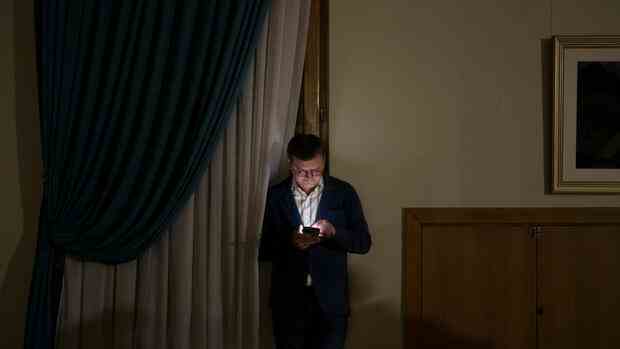Vienna When warring parties have no interest in peace negotiations, they propose impossible terms for it. It’s a megaphone diplomacy game that Russia and Ukraine are perfecting—to make the other side look like a bogeyman to the world public.
The proposal by the Ukrainian foreign minister to hold a peace summit mediated by the UN in February also fits into this category. The United Nations is the actor best able to bring all parties to the negotiating table, Dmitro Kuleba explained in an interview with the AP press agency on Monday.
However, he linked Russia’s participation to one condition: Moscow must first be held accountable for its war crimes in Ukraine by an international tribunal.
The idea of the summit is probably stillborn. However, its realization may not have been the main goal of Kuleba’s proposal. Rather, he may have been concerned with countering Moscow’s “peace propaganda,” which numerous international media have been spreading uncritically in recent days. “We don’t refuse talks, they do,” Vladimir Putin recently claimed on Sunday.
The Russian president, whose troops invaded the neighboring country ten months ago without provocation, did not even mention the Ukrainians by name. Putin sees them as puppets of the West and therefore does not recognize them as negotiating partners.
Maximum demands for negotiations.
(Photo: AP)
Consequently, the Kremlin commented on Kuleba’s move with the words that a peace conference without Ukraine is conceivable, but one without Russia is not.
The Kremlin has also ruled out any concessions on territorial claims. Russia claims not only the Crimean Peninsula, which was illegally occupied in 2014, but also the areas of Donetsk, Luhansk, Zaporizhia and Cherson, which have since been annexed at the cost of tens of thousands of lives. From Moscow’s point of view, negotiations serve at most to legitimize this land grab carried out as part of the aggressive war.
Despite successful counter-offensives, however, it is likely to become increasingly difficult for Kyiv to recapture occupied areas. Russia continues to control nearly a fifth of Ukraine’s territory. Except in the Donbass around the heavily contested city of Bakhmut, Moscow’s troops are more on the defensive. But the military leadership is sending tens of thousands of newly mobilized troops to the front and expanding their defense lines, which is likely to make a recapture more difficult in the medium term.
This makes it difficult for the government in Kyiv to fulfill its promise to bring all occupied territories, including Crimea, home. However, this is one of the 10 points formulated by President Volodymyr Zelensky in mid-November as a prerequisite for negotiations.
The longing for peace is growing everywhere – but not even a ceasefire is in sight.
(Photo: IMAGO/SipaUSA)
Further points are a tribunal that is politically hardly feasible and the immediate withdrawal of all Russian troops from Ukrainian state territory.
No interest in de-escalation
Since Moscow has not limited its war aims and continues to threaten all of Ukraine, even such a move is illusory. Russia has only ever withdrawn out of military necessity. And since these have been under pressure on the battlefield, the army leadership has relied on the destruction of civilian infrastructure.
The devastating attacks on the recently liberated city of Kherson in recent days, killing 16, do not suggest that Moscow would recognize any red lines.
Although Kyiv is largely concentrating on military targets, it also has no interest in de-escalation. The Russian air base Engels, 600 kilometers from Ukrainian territory, was the target of a suspected Ukrainian drone attack for the second time on Monday morning.
The attacks continue, the damage is becoming more and more devastating.
(Photo: IMAGO/Ukrinform)
Foreign Minister Kuleba also made it clear that peace talks at most complement military events: “Every war ends as a result of actions on the battlefield and at the negotiating table,” he said. With Russia shattering all trust with the 2014 annexation of Crimea and February’s invasion, a strong army remains Ukraine’s guarantee of survival.
However, the military stalemate and the lack of bargaining chips also mean that the war can go on for months or even years. Putin seems poised to wreck Russia’s economy, while Ukraine’s defense depends heavily on Western aid.
Hardly any prospects
Part of the public, including in the West, is inclined to believe the Kremlin’s perpetrator-victim reversal and see Kyiv as an uncompromising party to the war. This is tricky for Ukraine because it means that political support for military aid to Ukraine over the longer term is not set in stone.
Behind the scenes, Western capitals are exerting gentle pressure on Kyiv to refrain from maximum demands. But they also know how poor the prospects for negotiations are: they have little influence on Moscow, and they cannot and do not want to force Kyiv into a geopolitically devastating capitulation by withdrawing aid.
Accordingly, UN Secretary-General Antonio Guterres recently said that the fighting would probably continue for the time being. His spokeswoman commented on Kuleba’s initiative: “He can only mediate if all parties want him to mediate.”
More: Sanctions and export dependency – Economically things are going downhill
